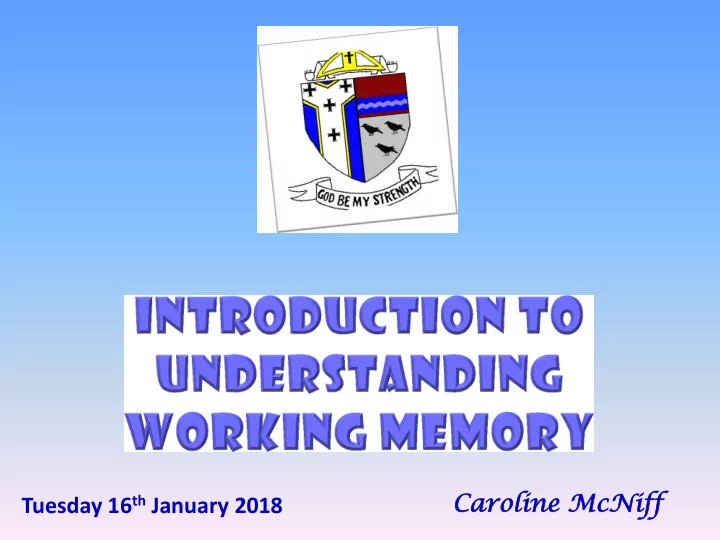

Car aroline oline McNiff Tuesday 16 th January 2018
There are many different components to memory including long term, short term and working memory. Generally, working memory is the term used to describe the ability we have to hold information in our minds and mentally manipulate this information over short periods of time. Professor S.E. Gathercole & T. Alloway
It can be described as: • a mental workspace • a mental toolbox • a mental notepad
7 5 2 8 9 3 8 3 2 4 9 6 2 1 4 6 1 9 7 0
Short term and working memory capacity varies from one individual to another.
Everyday examples: • remembering a web address while trying to find a pen and paper to write it down • following spoken directions • calculating the cost of the items in your supermarket basket while you are in the queue • measuring out and combining ingredients for a new recipe, without looking back to the book
Imagine being asked verbally to solve an addition problem without pencil or paper. How many steps would your brain go through? The process of learning to read is just as complex.
Working memory helps us to: • retain information for short periods • remember instructions • plan what to do next • focus on a task • with problem solving/complex thinking • with organisation • retrieve and process information in long term memory
Individuals have a personal limit to their working memory capacity. Working memory increases during childhood. Typically adult capacity, reached towards then end of the teenage years, is more than double that of a 4 year old. Differences between individuals of the same age can vary. In a typical class of 30 children aged 7 to 8: • three would have working memory capacities of an average 4 year old • three would have the capacities of an average 11 year old
Typically, individuals with poor working memory capacities in childhood do not catch up with their peers. Some environmental factors can lead to loss in information from the working memory: • Distraction. An interruption such as someone speaking to us or unexpected noise/stimulus. • Overload. There is a limit to the amount of information each person can hold. • Demand. Activities that are very demanding, requiring difficult/lengthy mental processing.
Typically these children: • have difficulty following instructions • frequently lose their place in multi step tasks • behave as though they have not paid attention; forgetting part/all of an instruction/message • have difficulty copying from the board • may abandon tasks altogether as they lose their place
Typically these children: • may be considered to have short attention spans, especially for auditory work • are easily distracted • have poor organisation • are forgetful or lose things • make poor academic progress particularly in reading and mathematics
There are several commercially available assessments that can be bought by schools. They are all suitable for children aged 4 and up. All involve the child having to store and manipulate information in their mind for short periods of time.
Activity • Copy the information from the board using your non-preferred hand. • You must complete it in 1 minute to succeed!
Put a hat on vowels ȏ ȇ and ȗ Hippeastrum (amaryllis), Lycopodium (clubmoss, Lycopersicon (tomato), Rhapidophyllum (needle palm), Liriodendron (tulip poplar), Chionanthus (fringe tree, granddaddy greybeard), Helianthus (sunflower), Eremochloa (centipede grass), Cynodon (Bermuda grass), Stenotaphrum (St. Augustine grass), Eriobotrya (loquat), Thelypteris (woods fern)
General strategies Think about memory load – sometimes less is more Give instructions in the order they are to be performed Ask child to repeat back instructions/information Break tasks into chunks Individuals don’t tend to remember information they don’t understand
Recommend
More recommend